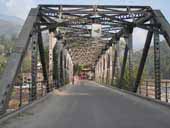FROM THE TELEGRAPH CORRESPONDENT
Siliguri, Feb. 26: The Association for Protection of Democratic Rights (APDR) and the Bharatiya Gorkha Parisangh today alleged that police had rampaged through Sukna after a police outpost there had been torched on February 21 and demanded action against the law enforcers responsible for the excesses.
A team comprising members of the APDR and the Parisangh — an apolitical body of Gorkhas — today visited Sukna, 10km from here, and demanded the release of all those who had been arrested in connection with the arson.
Eighteen people were arrested from Sukna after a mob demanding the arrest of a murder accused had set the outpost on fire.
“We went there today to verify the allegations levelled by several residents that police had resorted to indiscriminate arrests and ransacked houses and shops on Sunday night,” said Abhiranjan Bhaduri, the Darjeeling district secretary of the APDR. “The team spoke to the family members of the arrested people and found that after the arson, the police had picked up men and women indiscriminately.”
He alleged that innocent women had been dragged out of their homes and thrown into police vans. “They were beaten up when they tried to protest. This is blatant violation of law. We demand that the arrested people be released immediately and action be taken against policemen responsible for the incident.”
Bhaduri also alleged that the police had smashed windowpanes of the houses, ransacked shops and damaged vehicles. “An 80-year-old woman named Chandrakumari Rai told us that her daughter, son, daughter-in-law and employees serving at an eatery run by the family had all been picked up by the police.”
Bhaduri also said even patients had not been spared. “Damayanti Thapa, who had been operated on 10 days back and was recuperating, was also arrested.”
He said the office-bearers of both the organisations, armed with photographs and other evidence of police excesses, would meet senior district officials and demand the release of the arrested people.
Sukhman Moktan, the secretary-general of the Parisangh, echoed Bhaduri. “After the raids and random arrests by the police, Sukna has been shut down with life being far from normal. The men have left their homes to evade arrests, while the women are too fearful to open shops.”
The police, he said, should free all the arrested and refrain from targeting others at Sukna.











